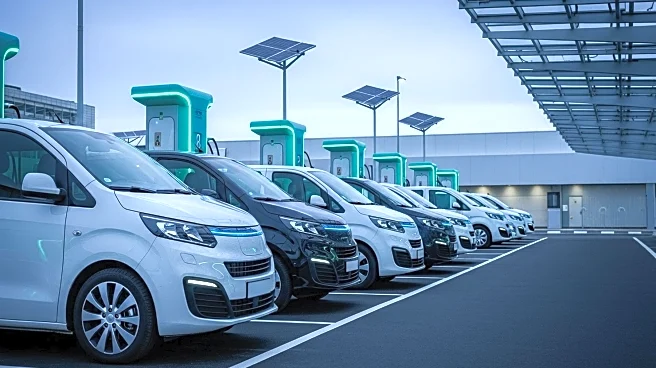What is the story about?
What's Happening?
Fleet operators are expressing declining expectations for the adoption of electric vans, according to a survey conducted by Arval's 2025 Mobility Observatory Barometer. The survey indicates that the anticipated percentage of battery electric vans in fleets by 2028 has decreased to 14%, down from 15% in 2024 and 18% in 2023. Similar trends are observed for plug-in hybrid vans, with expectations dropping to 14% from 15% in 2024 and 11% in 2023. Conversely, the expectation for petrol and diesel vans has increased to 71%, up from 64% in 2024 and 62% in 2023. John Peters, head of Arval Mobility Observatory in the UK, attributes these trends to operational challenges such as range limitations, payload issues, and charging difficulties faced by fleet operators.
Why It's Important?
The declining expectations for electric van adoption highlight significant challenges in the transition to zero-emission vehicles within the fleet industry. This trend could impact efforts to reduce carbon emissions and achieve sustainability goals, as fleets play a crucial role in transportation and logistics. The increased reliance on petrol and diesel vehicles suggests potential setbacks in environmental progress, affecting public policy and industry standards aimed at promoting cleaner transportation solutions. Fleet operators may face increased pressure to find solutions to operational challenges, which could drive innovation and collaboration within the industry.
What's Next?
Arval remains optimistic that the adoption of electric and plug-in hybrid vans will increase by the end of the decade, despite current pessimistic predictions. The company is actively working with its consultancy team to help customers address operational challenges and find effective solutions. The survey results indicate that similar issues are being faced by fleets globally, suggesting a need for international collaboration to overcome barriers to zero-emission vehicle adoption. Future developments may include advancements in battery technology, improved charging infrastructure, and policy incentives to encourage the transition to electric vehicles.


















